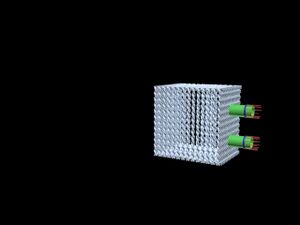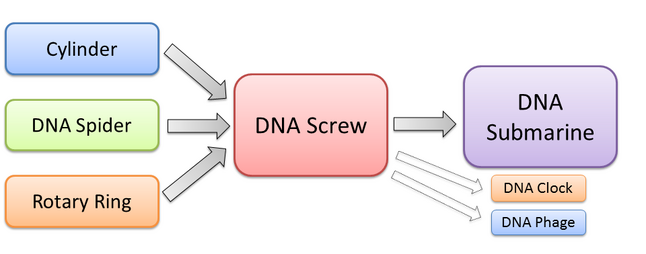Biomod/2013/Komaba/Project/2/
From OpenWetWare
Jump to navigationJump to search
<html>
<style type="text/css"></style>
<a href="/wiki/Biomod/2013">BIOMOD 2013</a> - DNA Screw - Komaba Team
</html>
Project
Background of Project
- There were many previous studies related to the spontaneous activities of biomolecules about Kinesin, which is a class of motor proteins, and walking DNA robots. But genuine nano-scale DNA motors which rotate at the stable speed were not yet created. In our project, we are aiming at creating the DNA screw system to achieve this goal.
- The rotation system is used to create the complex motion with any devices, such as drills, screws and clocks. Therefore we have thought that the nano-scale rotation system enables us to extend the future of DNA engineering. The DNA screw has many strong points. DNA screw is able to embed in any other DNA structures and to be assembled into more complex structures easily, because we can take engineering approaches to make DNA structures. And, the size of the structure can be easily scaled. In addition, DNA is a stable material than protein and can be used in various environments (ex. Temperature, pH and salt-density).
Project Overview
- The motor made in this project comprises three parts; the cylinder as an axis, the DNA Spiders as a source of power, and the rotating ring. In the first phase in the project, we design each part and confirm if each part is actually formed as we design by an Atomic Force Microscope. Then, in the second phase, we develop a method to combine those three parts, which results in construction of the DNA screw. If you need details of each experiment, please click ">>read more" link and jump to Design page.
(Phase 1)
Cylinder
- The cylinder is put in the center of the motor as an axis supporting the rotation. The material DNA is formed into a cylindrical shape using DNA Origami technology. >>read more
DNA Walker
- The sources of power in rotational motion is DNA Spiders. DNA Spider consists of three DNA Walker which moves on footing by taking strands after another with DNAzyme. As they orbit the cylinder, their rotational movement is transmitted to DNA Ring. >>read more
Rotary Ring
- It is the DNA ring part that actually rotates. It has shape like the side surface of a disk, and is also composed with DNA Origami technology. >>read more
(Phase 2)
Motor
- The motor is realized by assembling above thee parts: Cylinder, Spider, Ring. Unlike motors in electrical work, rotary parts of our motor is outer ones and the central cylinder are fixed. >>read more
Vision for the future(Phase ∞)

DNA submarine
- DNA submarine is a structure which move in a solution and transport materials. In addition, in combination with sensors made by DNA Origami technology, this DNA submarine would be able to develop into autonomous DNA robots which have the function of chemotaxis.
Other possible applicatioins
・DNA structure with the function of Phage
- By using the rotary motion of this DNA screw, the motion of a phage that makes a hole on a cell wall of bacteria could be imitated artifically. And in the end, it would be possible to make an artificial phage that is entirely consisted of DNA and controlled artificially.
・DNA Clocks
- Rotations of DNA screw can be stabilized by raising the number of DNA spiders, and then DNA screw will become a time counting machine like a clock. It would contribute to DNA computing technology by using it as a clock of CPU.
<html>
</html>
